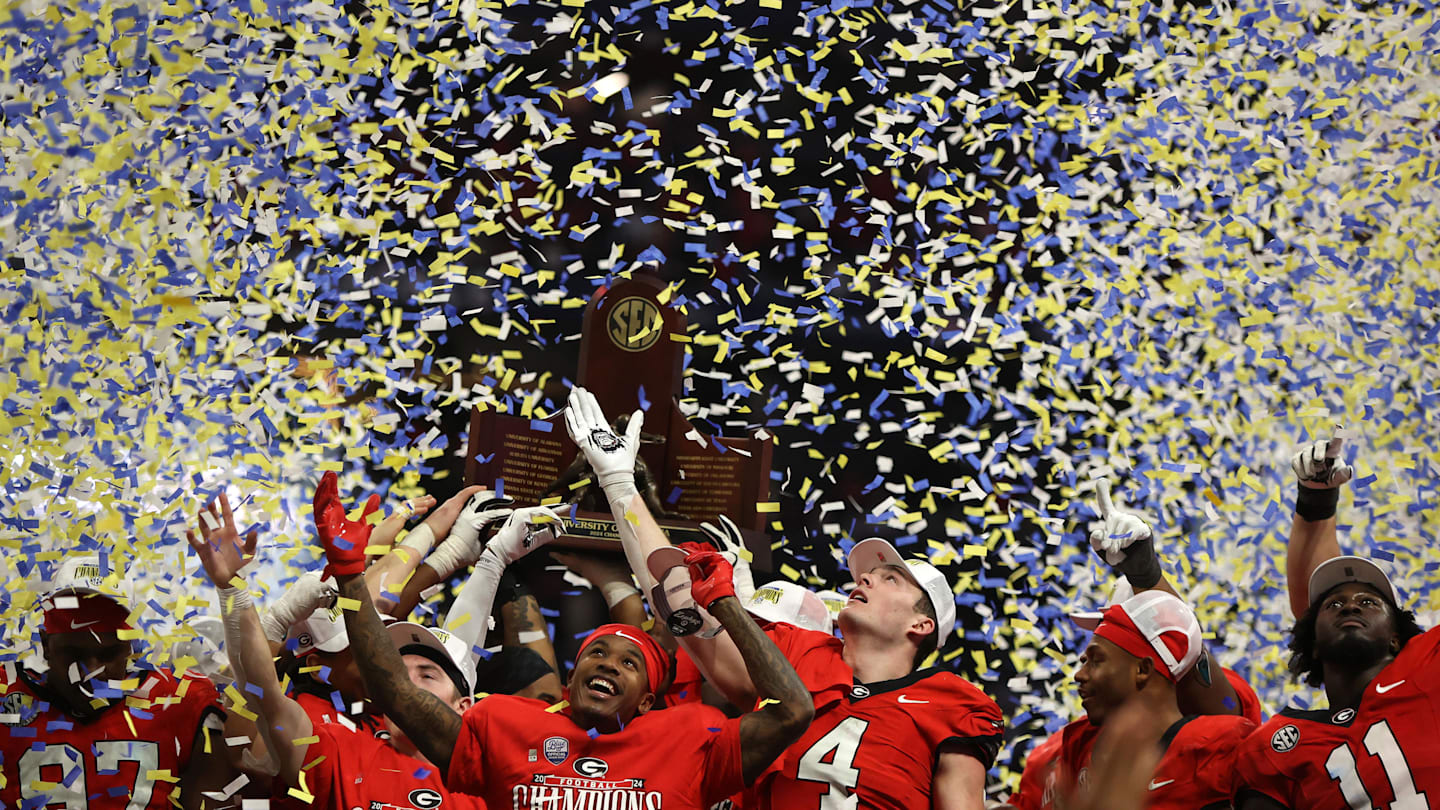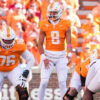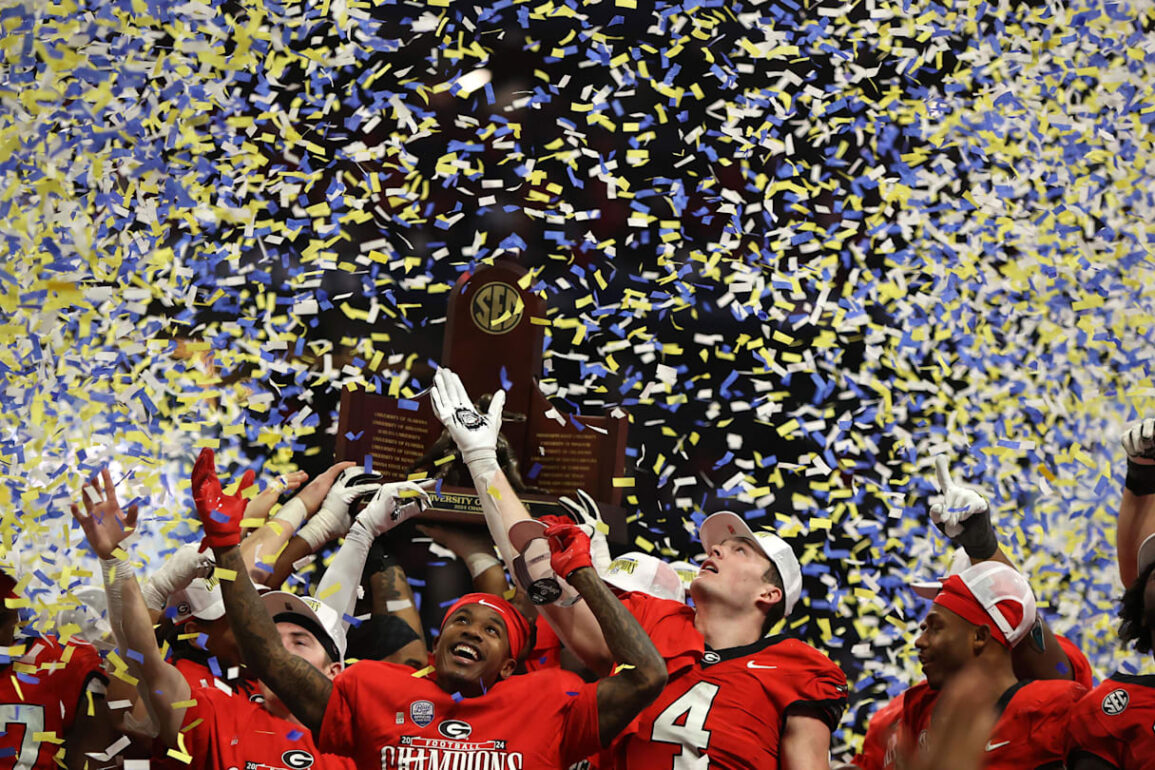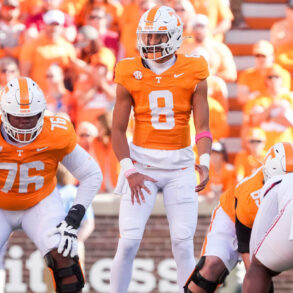
To understand football in the Southeastern Conference, you have to know about “The Kingfish.”
There was nothing average about Huey Long, Governor of Louisiana from 1928 to 1932 before serving in the United States Senate. A high-school dropout who taught himself and received a law degree after only one year of study, Long envisioned himself as the champion of the “little man” and an enemy of big business. His slogan was “Every Man is King,” and he was so confident of becoming President of the United States that Long wrote a book entitled “My First Days in the White House” which included details of his cabinet.
Long was also a huge fan of the Louisiana State University football team.
“As Governor of the State of Louisiana, I protest your calls,” he argued during the 1930 game against Arkansas. “I don’t mind you penalizing LSU, but penalize us in midfield. Don’t do it when we get down to the goal line.”
Of course, it wasn’t enough for Long to just root for the Tigers. Like nearly every other fan in the SEC, his team had to win, and he had to do his part.
“I don’t fool around with losers,” Long said. “LSU can’t have a losing football team because that will mean that I am associated with a loser.”
When ticket sales for the 1934 home opener against Southern Methodist were lagging in part because the Ringling Brothers Circus was also due to perform in Baton Rouge that night, Long politely informed the circus that he would have no choice but to enforce an obscure “animal-dipping” law.
Needless to say, the show did not go on that night. The circus delayed its trip, football ticket sales rose, and LSU managed to tie SMU, 14-14.
Later that same year, Long “secured” six special trains by “reminding” the Illinois Central Railroad that the value of railroad bridges in the state could easily rise from $100,000 to $4 million. He used them to take 5,000 LSU fans from Baton Rogue to Nashville for the LSU game at Vanderbilt. On the day of the trip, he had to work out how dozens of armed Louisiana police officers could cross the border, with the Tennessee Game and Fish Commission deciding that they could enter the state as “deputy game wardens” to guard whatever “wildlife you may see fit.”
Also along for the ride was a 125-piece marching band and 1,500 students wearing new grey uniforms that were rushed from tailors. Newspapers reported that Long loaned any student who was short on funds $7 to make the trip. He was quoted as saying the money came from “contributors.”
Although Long deflected speculation that he would announce his bid for the White House during the trip, he did make a pregame speech and boldly predicted an LSU victory. While standing on the sidelines, Long watched the Tigers do just that, 29-0.
Less than a year later, on September 8, 1935, Long was assassinated by the son-in-law of a long-time rival in the Capitol building in Baton Rouge. Although his bodyguards killed the assailant, he took a bullet in the stomach and died two days later. Long’s last words were: “… My God, my God, I have so much left to do. Who will look after my darling LSU?”
Yes, football is a little different among the schools that make up the SEC, and that includes its all of the schools that joined during the last three waves of expansion. To the fans, and just about everyone else who lives in those 12 states, it’s so much more than a game, including identity, history, honor and pride.
“Southerners are proud of their football heritage, their schools, and their teams,” said George Mooney, the Voice of the Tennessee Volunteers (1952 to 1967) and initiator of the Vol Navy. “And they share a deep pride that goes with being from the South.”
Southern writer and novelist Paul Hemphill once wrote: “Football is less a way out, than a way of life. No other sport has a chance in Alabama.”
Actually, that was an understatement.
Since football became the dominant sport on many Southern campuses after World War I, it has meant everything to these people, and been handed down from generation to generation.
They crow at South Carolina, bark at Georgia, and at Florida they Growl, which is the also name of the world’s largest student-run pep rally, attracting more than 70,000 the night before the homecoming game (performers have included Bill Cosby, Bob Hope, Robin Williams, Jay Leno, Jerry Seinfeld and Howie Mandel) .
Mississippi State fans proudly proclaim “Friends don’t let friends to go to Ole Miss.” At Alabama, “Secret Witness,” a rub against Tennessee, is a popular T-Shirt. LSU fans frequently have “Geaux Tigers” displayed on their car bumpers, though one could make a living selling anti-Bama slogans at Auburn.
They even take their mascots very seriously.
When Mississippi State’s original bulldog mascot Bully was killed on November 19, 1939 by a campus bus, he was buried under the bench at the 50-yard line of Scott Field. More than 2,500 people paid their respects and Life magazine attended the funeral.
Before LSU home games, Mike the Tiger, a real Bengal tiger, would ride in a cage on the field and parked near the visiting locker room as that was the first thing the opposing players say coming out to the field. The original Mike, who had the job for 20 years, died during a six-game losing streak in 1956. His death was kept a secret until the string was snapped.
In 1991, Tennessee’s coonhound mascot, Smokey VI, was listed on the injury report after suffering heat exhaustion during a game with UCLA. When Georgia’s bulldog was to have knee surgery, coach Vince Dooley commented that “Uga’s injury has gotten more national attention than my two running backs,” referring to Tom Worley and Keith Henderson, who were both coming off serious injuries sustained during the 1986 season.
They scream “War Eagle” at Auburn, “Go Cocks” at South Carolina, and at Mississippi State the coach once tried to inspire his team before playing the Texas Longhorns by castrating a bull (and you bet it worked).
They play “Dixie” at Ole Miss, cry “Sooey” at the top of their lungs at Arkansas, yell “Go to hell Ole Miss” at LSU, and smoke cigars at Alabama after beating Tennessee. There’s the Sooner Schooner at Oklahoma, the Gator chomp at Florida, and Texas, of course, has a longhorn steer. More than 100 years ago, the original Bevo ended up being barbecued for a football banquet.
When Kentucky playe home games at Commonwealth Stadium, which opened in 1973 and had a seating capacity of 67,606 (since reduced to 61,000 through renovations) , it became the third largest city in the state.
At Tennessee, Neyland Stadium (101,915) has been reconfigured so many times to squeeze in more fans than that it reminds many of a woman trying to fit into the same girdle after giving birth.
Speaking of women, at many SEC schools the female students often dress up for games, are as vocal as their male counterparts, and insult their counterparts by openly speculating if they have all their teeth and man parts.
Have you ever heard a “Big Ten” chant? While fans from the North wonder, “What’s the deal with all the majorettes?” their Southern brethren are busy trying to figure out, “How can we beat those Yankee bastards?” The crafty Commodores of Vanderbilt were the first to figure it out, and everyone else followed.
“I just didn’t hear from Georgia people, but from people from all over the South,” Dooley said after winning at Michigan in 1965. “To go up there and invade the North and come back a winner was the greatest thing for a lot of people. It was as if we had had a chance to go to Gettysburg again.”
The most recent additions to the conference fit in almost immediately.
For example, when word reached Austin that Arkansas was going to join the SEC in 1990, the Texas legislature actually passed a bill to try and force the Razorbacks to stay in the Southwest Conference. Instead, the departure proved to be a death blow to the league while giving Razorbacks fans another reason to hate Texas. Texas A&M and Mizzou were the next wave of additions in 2012, and then Texas and Oklahoma followed suit, leaving the Big 12 for the SEC in 2024.
At South Carolina, which regularly has more than 80,000 on hand at Williams-Brice Stadium to see a team that has never played in a major bowl game, fans stormed the field and tore down the goalposts in 2000 when it snapped a string of 21 consecutive losses by defeating New Mexico State. The Gamecocks came into the game with three winning seasons over the previous 33 years (most of which came prior to joining the SEC).
Just 10 years later, they rushed the field again following its first victory over an opponent ranked No. 1. No one knew it at the time, but in the process the South Carolina fans started a unique celebratory trend against Nick Saban’s teams at Alabama. Over his final 16 seasons leading the Crimson Tide (2008-23), hailed as the greatest dynasty the sport had ever seen with six national titles, only five other SEC programs were able to pull off a win against Alabama on their own field (Auburn including the Kick Six, LSU, Ole Miss, Texas A&M and finally Tennessee in 2022 to snap a 15-game losing streak in the Third Saturday in October rivalry). Fans at Oklahoma and Vanderbilt stormed as well following wins in 2024, never mind that Saban was no longer the coach. They weren’t about to let a detail like that keep them from enjoying a taste of success after being dominated for so long.
“Football is the essence of America, but not because of championships or titles. The drive to compete, the guts to play, the will to come from behind, the grace to walk off the field a loser, that’s the essence of football.”
– Archie Manning
Even the media stands out in the SEC. One of the region’s signature talk shows, hosted by Paul Finebaum, talks college football year-round and used to have in the daily introduction: “Where legends are made, and coaches … fired.”
When Richard Ernsberger was putting together his book “Bragging Rights,” Florida coach Steve Spurrier told him, “You tell Coach [Phillip] Fulmer that the Swamp is going to be loud this year. As loud as it’s ever been.” When he did in a phone interview with the Tennessee coach, the other end of the phone got very quiet.
FYI, both Ernsberger and Finebaum are from Tennessee. So was arguably the best college football writer in history, who penned the famous passage: “Outlined against a blue, gray October sky the Four Horsemen rode again. In dramatic lore they are known as famine, pestilence, destruction and death. These are only aliases. Their real names are: Stuhldreher, Miller, Crowley and Layden.” Grantland Rice went to Vanderbilt.
“Football is an honest game,” Alabama’s favorite quarterback Joe Namath said. “It’s true to life. It’s about sharing. Football is a team game. So is life.”
In the SEC, the game is reflected in nearly every facet of society, and seeps into every crevice of Southern culture.
In the SEC, they are dedicated:
“When I started at LSU in 1983, there were only two sports,” said LSU athletic director Skip Bertman, “football and spring football.”
They are family-oriented:
“When you go to a game in the South, you’re likely to see four generations together,” Arkansas coach and athletic director Frank Broyles said. “It’s part of our heritage, and that heritage is passed along from generation to generation. It means something very important to our people.”
They can see things relatively:
“A tie is like kissing your sister,” said Alabama coach Paul “Bear” Bryant, who also coached at Kentucky and was an assistant at Vanderbilt.
They ask thought-provoking questions:
“I don’t understand why kamikaze pilots wore crash helmets,” said Lou Holtz, who coached at Arkansas and South Carolina.
They demand the best:
“It was rot-gut. It wasn’t even good stuff,” Bertman said after stadium security found 54 fifths of whiskey taped under the student section bleachers before a game at Tiger Stadium. In similar fashion, after Bryant picked up a bottle a Georgia Tech fan had thrown at him (back when the Yellow Jackets were in the SEC), he quipped: “I thought Tech people drank a better brand of whiskey than this.” However, Bryant was wearing helmet at the time for protection, after Georgia Tech’s Chick Graning sustained a broken nose, a broken jaw, and lost five teeth on a shot to the face from Darwin Holt during the previous meeting.
They have lofty expectations:
“If I had hired Jesus Christ, then people would just gripe that he had long hair and sandals,” LSU athletic director Joe Dean after hiring Charley Hallman and Gerry DiNardo as football coaches.
They have religion:
“The definition of an atheist in Alabama is a person who doesn’t believe in Bear Bryant,” Georgia coach Wally Butts said. But there’s also a famous joke Auburn fans tell about the time Bryant and Shug Jordan went fishing together, and the Bear openly wondered if he could actually walk on water like all the Bama fans believed. He stepped out of the boat and immediately fell into the water. After swimming back to the boat and reaching up to Jordan, Bryant said, “Shug, promise me you won’t tell the Alabama fans I can’t walk on water.” Jordan replied, “Okay Bear, just as long as you promise not to tell the Auburn fans that helped you back into the boat.”
They have fine dinning:
“If you’re not a Gator, you’re Gator bait,” Spurrier said.
They take loyalty seriously, especially after an allegiance changes:
“I know what hell is like,” Mississippi State athletic director Dudy Noble said. “I once coached at Ole Miss.”
They insult:
“We’re looking forward to playing Mississippi State on the road this year,” Bertman said. “Word is a tornado blew through Starkville late last season and did $2 million worth of improvements.”
They learn:
“Peyton tortured me pretty good,” Ole Miss quarterback Eli Manning said about his older brother, who played at Tennessee. “He would pin me down and knock on my check with his knuckles and make me name 10 schools in the SEC or in the Big Ten. He wouldn’t stop until I did. I probably wouldn’t know all my divisions and teams if it wasn’t for that.”
They play hard:
“It didn’t matter if he was big or small, fast or slow, All-American or second team, my job was to beat him and beat him soundly,” three-time LSU All-American Tommy Casanova said.
They play really hard:
“His ear had a real nasty cut and it was dangling from his head, bleeding badly,” Tennessee lineman Bull Bayer said about Alabama’s first All-American, Bully Vandegraaff. “He grabbed his own ear and tried to yank it from his head. His teammates stopped him and the managers bandaged him. Man, was that guy a tough one. He wanted to tear off his own ear so he could keep playing.”
They go crazy:
“Here, where the hills are high, Tennessee fans are calling on the Volunteers to give the state its first clear claim to national honors,” United Press International’s Henry McLemore wrote in the midst of the 1939 undefeated season. “Knoxville is the perfect example of civil lunacy. Every suburb is a wing of an asylum.” (Incidentally, Tennessee went on to finish the regular season 10-0 without giving up a single point, but endured the first of two shutout losses to Southern Cal in the Rose Bowl, 14-0.)
They pay attention to the competition:
“What did I learn coaching at LSU? Basically, that the conference office in the SEC wants to be able to say they have great football and the conference office in the Big Ten wants to be able to say they graduate their athletes,” DiNardo said.
They don’t let up:
“You can’t be selective about when you compete in this league,” Saban said while at LSU (2000-04), where he won his first national title. “You can’t be selective about when you want to play hard and when you need to play well, because every game you play is a real challenge, and an important one.”
They demand:
“To err is human, to forgive divine. But to forgive a football coach is unheard of,” Dooley said.
They don’t believe in mediocrity:
“The only way I know to keep football fun is to win,” Mississippi State coach Darrell Royal said. “There is no laughter in losing.”
And they absolutely, positively love their football.
“In the South, college football isn’t just a game. It’s who we are,” said Bill Curry, who left Alabama after someone threw a brick through his window. His team had won the SEC championship but had committed the sin of losing to Auburn.
He also once said, “The best way to describe football in the South is hysteria … mass hysteria.”
This is the first part of a long-long series about the history of SEC football. Some of the material was used in the book “Where Football is King,” by Christopher Walsh
This post was originally published on this site be sure to check out more of their content.








